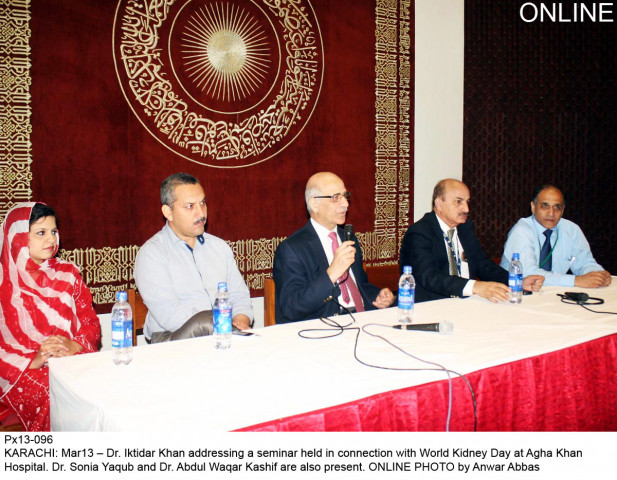World Kidney Day: ‘Chronic disease is undetected till ¾ of kidney function is lost’
Symptoms become visible when the kidney is functioning at only 10 per cent of its rate.

“Low birth weight infants face a greater risk of the disease than the healthy ones," Dr Iktidar Khan said at the Aga Khan University on Thursday. PHOTO: ONLINE
“The CKD is a progressive condition in which the kidneys lose their function over a period of months or years,” said Aga Khan University nephrology department head Dr Waqar Kashif. He was addressing a public health awareness programme at the AKU to mark World Kidney Day on Thursday.

The international theme for World Kidney Day 2014 is to create awareness about the chronic kidney disease. “CKD can develop at any age but it is more common among older people.”
In addition to the natural aging of kidneys, many conditions which damage the kidneys are more common in older people, including diabetes, high blood pressure and heart diseases, said Dr Kashif.
“It is estimated that about one in five men and one in four women between the ages of 65 and 74 years suffer from the kidney disease.” Symptoms of the disease become visible when the kidney is functioning at only 10 per cent of its rate. “In this case, you have to go for regular check-ups,” said Dr Kashif.
“The older you get, the more likely you are to suffer from kidney diseases. CKD increases the risk of heart attack and stroke and, in some cases, can progress to kidney failure requiring dialysis or transplantation,” explained AKU nephrology department’s assistant professor Dr Muhammad Abdul Mabood Khalil.
“The disease should be stopped at the initial stage as 64.3 per cent patients are at stage-one, while only 0.2 per cent patients reach stage-five. Early diagnosis and treatment can keep the disease from getting worse and can prevent or at least delay the need for dialysis or transplant.”
The main predisposing factors behind the disease are the prevalence of diabetes and high blood pressure among the senior population. The intake of vegetables and fruits is a way to prevent CKD, said Dr Khalil.
Early diagnosis and treatment of renal stones can prevent the development of CKD, pointed out AKU Paediatrics and Child Health department professor Dr Iqtidar Ahmad Khan. “Low birth weight infants face a greater risk of the disease than the healthy ones. The size of their kidney remains small which results in breathlessness, short stature, and weakness in bones. These are some symptoms of CKD among infants and children,” informed Khan.
The nephrology department’s senior consultant Dr Sonia Yaqub said, “When kidneys fail, a patient has three treatment choices - hemodialysis, peritoneal dialysis or kidney transplant.” Hemodialysis cleans and filters the blood through a machine to temporarily rid the body of harmful waste, extra salt and extra water. Hemodialysis is usually done three times a week and each treatment lasts for three to four hours. Peritoneal dialysis is another procedure that removes waste, she added.
“Dialysis is very expensive, as most of the medications are imported from abroad. Transplants are much cheaper than dialysis as the medications for transplants are made in India,” said Dr Yaqub.
Published in The Express Tribune, March 14th, 2014.



















COMMENTS
Comments are moderated and generally will be posted if they are on-topic and not abusive.
For more information, please see our Comments FAQ